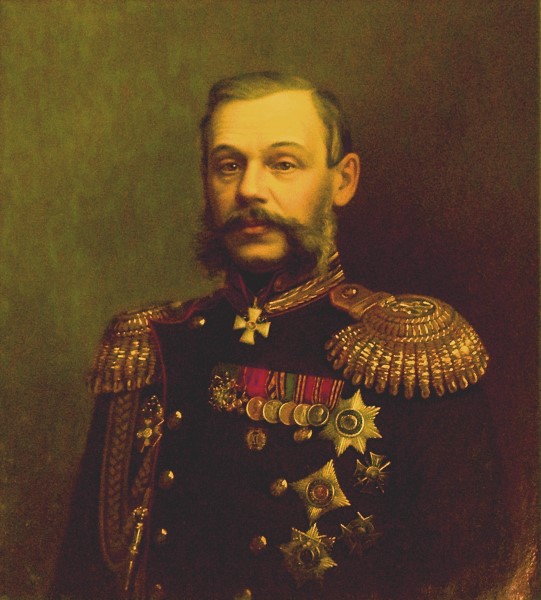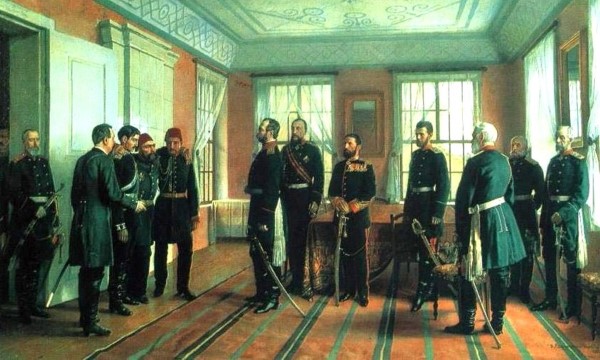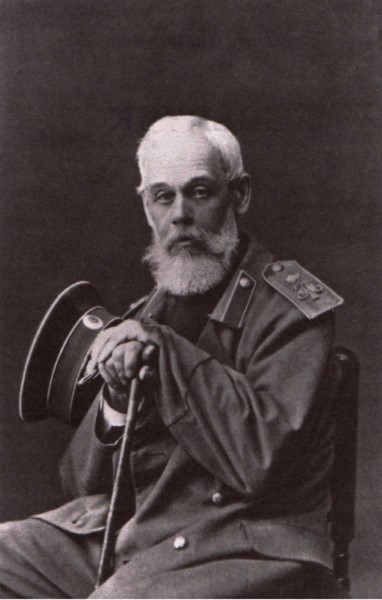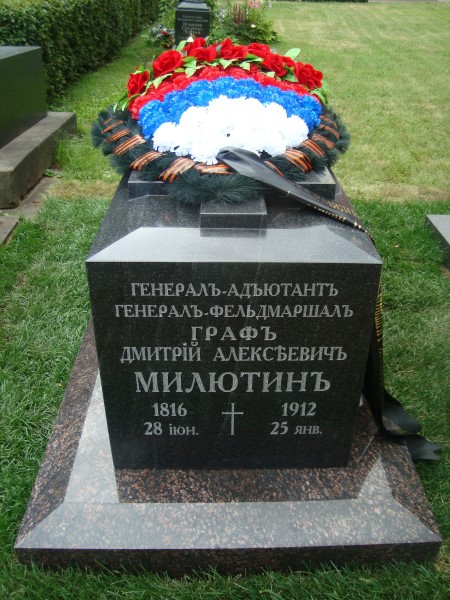
The Last Field Marshal
/ Главная / Russkiy Mir Foundation / Publications / The Last Field MarshalThe Last Field Marshal
Milyutin had an ancient, well-know at some point – a lane in Moscow is named after his grandfather – but a bankrupt family of Serbian background. His father was one of those people, who are unlucky in all the spheres of life… except for love.
“He was a Titular Counsellor, She was a General’s Daughter”
Or, to be more precise – a General’s sister. Elizaveta Dmitrievna, younger and only sister of an almighty Nikolai I’s favorite Pavel Dmitrievich Kiselev. We should pay the respects to the General – he did not prevent this marriage with a nobleman of humble origin. But he warned them strictly beforehand, that he would not go into nepotism for future nephews and nieces – he wanted them to go through it themselves. It turned out to be the opposite way – the older nephew, who achieved high ranks, got a job of the Russian Ambassador in Paris for his ageing uncle…

Student of Boarding School under the Moscow University, an exceptionally “civil” Dmitry, reversed his destiny unexpectedly – he started military service in March, 1833. His energy of lower class together with his mathematical order of mind and inborn abilities, contributed to his fast career.
Sub-lieutenant of the General Staff at 23, colonel at 31, he became a General at 38. At the same time, he got a prestigious Demidov’s award and had an Academy of Science associate’s title. It was the time, when disaffection of many hereditary officers for Milyutin rose. Partly, they can be understood. The titles they had to serve for years in distant garrisons came themselves to the rootless parvenu…
“No Claims for Their Insignificant Capital…”
Meanwhile, Milyutin on his own free will went to the frontline to Caucasus when he was 23, was wounded badly there, but did not leave from the front line on his own free will at all. Military commanders then used power-based methods when conquering mountaineers. Milyutin preferred another way:”We have to use every opportunity to agree our power with both material and moral interest of mountaineers themselves. They have to be sure Russia is so mighty it has no claims for their insignificant capital…”
He was on the sidelines also after the start of Crimean war. His comrade Aleksandr Baratyanskiy, who will later win Shamil, cronyed Milyutin, who was not at all aspiring to get the titles. Destiny will divide them apart in 1870s… here is the characteristics from Baratinskiy’s private letter to the tsar about Milyutin:
“He is a person, who is prone to everything kind, he is honest, aspiring, incomparably sedulous and highly sensitive to confidence and good treatment, always careful, noble, without a trail of nit picking, far from greed and any kind of envy”.
At the same time: “He has a special relation to… all the men of letters and all the graduates in general… he is hostile to everything aristocratic and unfortunately has a trait, which unites all the Russians – he hates everything, which does not have a Great Russian origin”.
Baratyanskiy noticed one of the main traits of the new minister’s character – he surprisingly combined the incompatible – “technical” way of thinking and love for humanities, literature in the first place, strong liberal convictions and uncompromising loyalty to the imperial policy.
Humanizing Through Reforms
He was the one who had to introduce reforms and – what is most important – humanize one of the most conservative institutions of the Russian society – the Army. Milyutin thought about it for a long time. In his opinion, they should have start from possible freeing of individual persons form the harsh military discipline.
On November 9, 1861, Milyutin was named the Military Minister and stayed at the position for almost twenty years. In two months after an intensive brainstorm, when all its participants and the Minister himself had only 3-4 hours of sleep a day, project of Army reorganization was presented to Alexander II.
He appended his famous resolution: “Everything in this document is in total accordance with my own wishes and thoughts”.

Organizational means, taken by Milyutin, are well-known, for instance division of the country in military districts. By the way, the present boundaries of federal districts almost totally copy those of Milyutin. Renounce of recruiting – recruit formally went to the army, but practically into slavery for almost all his life. He changed it for a gradual compulsory military service for all the classes.
The measures aimed at the main military entity – a soldier – are less known. “Enhancement of Army is based on educating its units, on developing their natural skills, both physical and intellectual…” wrote Milyutin.
Service for Everyone
According to the new Statute, military service was compulsory for all the men over 21 in the Empire – without class difference. From our point of view, the term of service was a bit long – six years in the army and seven in the fleet.
The only sons in a family were not liable for military service by no means. Neither were older sons, if they had brothers under 18, breadwinners of ill and disabled parents. A long draft exemption was granted for the next brother of the man, who was already in the army. Instead of rods, they used total teaching of reading and writing.
Educated men were either not liable to serve at all, or served for only half a year. It was Milyutin, who was among the first ones to write that soldier has to be indeed a soldier, not a builder of general’s mansions.
Russian-Turkish War of 1877–78 provided an opportunity to check efficiency of the reforms. 25 years after the Crimean shame, the new army shaped by Milyutin, was standing at the gates of Constantinople. Many thought it was a dream, which came true, including the hero of the Sevastopol’s defense Totleben…
The results achieved made the last three years of Milyutin’s ministerial work his “moment of glory”. He was granted a count’s title, Saint George Order of the second class right away and – virtually – leading Russia’s foreign policy.
The Simeiz Hermit
Milyutin’s career finished in a week after the death of Alexander the Liberator at a notorious meeting at the Winter Palace on March 8, 1881 after a hysterical (as one of its participants described) speech of “Grand Inquisitor” Pobedonostsev, to whom Milyutin dared to oppose. He was 65 and soon after that, he got the highest rescript, the meaning of which was quite understandable: “It’s high time you, mister ex-minister, went to your mansion in Simeiz”. Simeiz, which is now considered the “healthiest” places in Crimea for a reason, extended Milyutin’s life for 30 years.

They sometimes remembered about him – when they opened a monument to Aleksander II in Kremlin in 1898, 82-year-old Milyutin came from Crimea and was the last Russian to get a baton from Nikolai II.
How do all the good stories we know from childhood end? “They lived long and happily, and died together on the same day”. It was just the case – Milyutin outlived his 90-year-old spouse, who died in January 1912, for two days. They were buried in the old cemetery of Novodevichiy Convent, on the left from the refectory church entrance. The tomb was destroyed during the Soviet times, but restored this year, on July 7th, before the jubilee.

Restored Milyutin’s tomb in the Novo-Dyevitchiye Cemetery
New publications

 Mikhail Kalatozov, a director who transformed the world of cinematography in many ways, was born 120 years ago. He was a Soviet film official and a propagandist. Above all, he was capable of producing movies that struck viewers with their power and poetic language.
Mikhail Kalatozov, a director who transformed the world of cinematography in many ways, was born 120 years ago. He was a Soviet film official and a propagandist. Above all, he was capable of producing movies that struck viewers with their power and poetic language.  Ukrainian authorities have launched a persecution campaign against the canonical Ukrainian Orthodox Church (UOC), the biggest one in the country's modern history. Over the past year, state sanctions were imposed on clergy representatives, searches were conducted in churches, clergymen were arrested, criminal cases were initiated, the activity of the UOC was banned in various regions of the country, and monasteries and churches were seized.
Ukrainian authorities have launched a persecution campaign against the canonical Ukrainian Orthodox Church (UOC), the biggest one in the country's modern history. Over the past year, state sanctions were imposed on clergy representatives, searches were conducted in churches, clergymen were arrested, criminal cases were initiated, the activity of the UOC was banned in various regions of the country, and monasteries and churches were seized.  When Nektary Kotlyaroff, a fourth-generation Russian Australian and founder of the Russian Orthodox Choir in Sydney, first visited Russia, the first person he spoke to was a cab driver at the airport. Having heard that Nektariy's ancestors left Russia more than 100 years ago, the driver was astonished, "How come you haven't forgotten the Russian language?" Nektary Kotlyaroff repeated his answer in an interview with the Russkiy Mir. His affinity to the Orthodox Church (many of his ancestors and relatives were priests) and the traditions of a large Russian family brought from Russia helped him to preserve the Russian language.
When Nektary Kotlyaroff, a fourth-generation Russian Australian and founder of the Russian Orthodox Choir in Sydney, first visited Russia, the first person he spoke to was a cab driver at the airport. Having heard that Nektariy's ancestors left Russia more than 100 years ago, the driver was astonished, "How come you haven't forgotten the Russian language?" Nektary Kotlyaroff repeated his answer in an interview with the Russkiy Mir. His affinity to the Orthodox Church (many of his ancestors and relatives were priests) and the traditions of a large Russian family brought from Russia helped him to preserve the Russian language.

 The leaders of the Friends of the Great Russia cultural association (Amici Della Grande Russia) in Italy believe that the Western policy of abolishing Russian culture in Europe has finally failed. Furthermore, it was doomed to failure from the beginning.
The leaders of the Friends of the Great Russia cultural association (Amici Della Grande Russia) in Italy believe that the Western policy of abolishing Russian culture in Europe has finally failed. Furthermore, it was doomed to failure from the beginning.  Name of Vladimir Nemirovich-Danchenko is inscribed in the history of Russian theater along with Konstantin Stanislavski, the other founding father of the Moscow Art Theater. Nevertheless, Mr. Nemirovich-Danchenko was a renowned writer, playwright, and theater teacher even before their famous meeting in the Slavic Bazaar restaurant. Furthermore, it was Mr. Nemirovich-Danchenko who came up with the idea of establishing a new "people's" theater believing that the theater could become a "department of public education."
Name of Vladimir Nemirovich-Danchenko is inscribed in the history of Russian theater along with Konstantin Stanislavski, the other founding father of the Moscow Art Theater. Nevertheless, Mr. Nemirovich-Danchenko was a renowned writer, playwright, and theater teacher even before their famous meeting in the Slavic Bazaar restaurant. Furthermore, it was Mr. Nemirovich-Danchenko who came up with the idea of establishing a new "people's" theater believing that the theater could become a "department of public education."  "Russia is a thing of which the intellect cannot conceive..." by Fyodor Tyutchev are famous among Russians at least. December marks the 220th anniversary of the poet's birth. Yet, he never considered poetry to be his life's mission and was preoccupied with matters of a global scale. Mr.Tyutchev fought his war focusing on relations between Russia and the West, the origins of mutual misunderstanding, and the origins of Russophobia. When you read his works today, it feels as though he saw things coming in a crystal ball...
"Russia is a thing of which the intellect cannot conceive..." by Fyodor Tyutchev are famous among Russians at least. December marks the 220th anniversary of the poet's birth. Yet, he never considered poetry to be his life's mission and was preoccupied with matters of a global scale. Mr.Tyutchev fought his war focusing on relations between Russia and the West, the origins of mutual misunderstanding, and the origins of Russophobia. When you read his works today, it feels as though he saw things coming in a crystal ball...